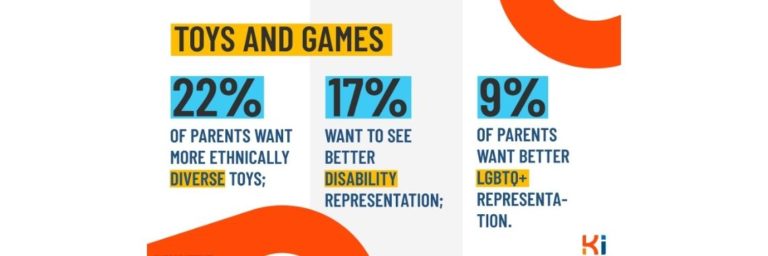A greater need for diversity and inclusivity across children’s toys and games
No data
Latest News

Family-focused marketing agency Kids Industries (Ki) has this week launched a new report, exploring the concept of diversity and inclusion amongst children and their parents – and what this looks like in the toys and games that they engage with.
The survey – carried out across 2,001 parents of children (aged 5-15) in the UK and USA – paints a picture of rising concerns from parents over screen time, yet also acknowledges how they appreciate the benefits of digital play. There is however a desire from parents for more inclusive toy and gaming attributes.When it comes to the toys their children play with, parents are looking for skills support.
What parents notice: Parents would like more opportunities to play as a family (38 percent) and 35 percent would like to see toys that focus on imagination. Another important observation was that parents are looking for toys made from materials that are better for the planet (33 percent). Key issue: Parents are busy people and 21 percent say that they struggle to always find the time to play, watch, or do things with their child that they enjoy (rising to 27 percent amongst US parents; 16 percent in the UK). With that in mind, parents are keen to support their children’s skills development and 40 percent would like to see more toys that help with traditional education e.g., maths and the same number would like more toys that help with ‘soft’ education e.g., problem solving. Moving forwards: In terms of representation, parents would like to see no differentiation between “girl” and “boy” toys (22 percent) and an increase in positive role models (37 percent). More ethnically diverse toys were a desire for 22 percent and 17 percent wanted to see better disability representation. Better LGBTQ+ representation sat at nine percent.Parents want to be involved in children’s video games
What parents notice: 46 percent of all parents feel that screen-based play is good for their children’s development (42 percent of UK parents versus 49 percent of US parents). 57 percent of parents also recognise that digital play is relaxing for their child and 56 percent say that it puts them in a good mood (rising to 62 percent amongst US parents – UK sits at 51 percent). They also feel that digital play expands the things their children are able to see and do (56 percent). 52 percent felt that it enables their children to be more creative or imaginative also. Key issue: Over four out of five parents (84 percent) feel that their children spend too much time in front of screens – consistent across all ages (5-7 – 83 percent; 8-11 – 85 percent; 12-15 – 84 percent). They’re also concerned that screen-based play leads to less socialisation (42 percent) and feel that it limits the things their children can see or do (17 percent). Moving forwards: Parents would like more opportunities to play as a family (37 percent – 39 percent in the US and 35 percent in the UK) and 31 percent are keen to see new & innovative ways to play and interact. Again, there’s a strong desire for more positive role models in the games their children play (41 percent) along with support for games that provide soft’ education e.g., problem solving (37 percent) and traditional education e.g., maths skills (31 percent). Having games that include better disability representation is of interest to 18 percent of parents and 11 percent would like to see better LGBTQ+ representation.Gary Pope, CEO and Co-Founder at Kids Industries and Children’s Commissioner for Products of Change, commented:
“Play underpins everything that our children will become – it is as Maria Montessori said: ‘The work of the child.’ Our research indicates that 67 percent of parents feel their children’s schools are good or excellent when it comes to their diversity and inclusion policies and approaches which shows there is much more work to be done. We must listen to children and parent voices and ensure their needs and wants are reflected in the toys and games that they consume. Nothing is more important than protecting and promoting a child’s right to play and making those play experiences the very best that they can be is essential and something that the industry needs to give serious consideration.” www.kidsindustries.comShare your story
Want to share your news story through Nursery Online? Drop us a line using our news form or send us an email.

© 2024 THE MEDIA SNUG ALL RIGHTS RESERVED - COMPANY NUMBER 06380497
